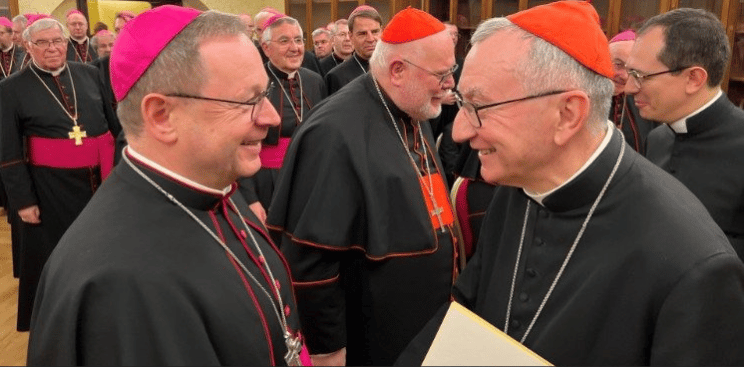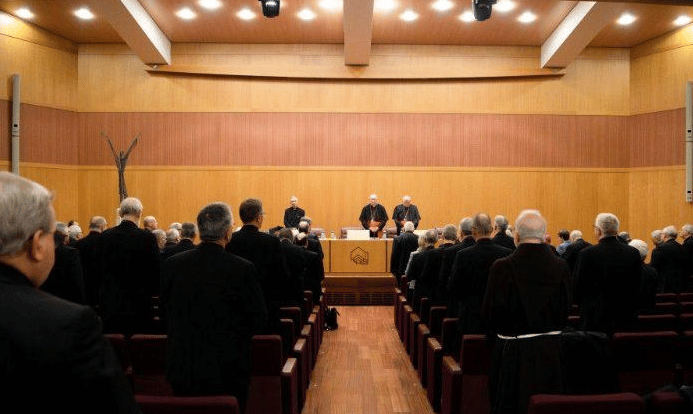The German Bishops were in Rome this week for their “ad limina visit” and met with Pope Francis on Thursday.
As they concluded their visit, on Friday, the bishops attended a meeting with the Heads of some Dicasteries of the Roman Curia at the Augustinianum Institute in Rome to reflect together on the ongoing German Synodal Path.
This process, was convened in 2019, before the worldwide convocation of the 2021-2024 Synod on Synodality, to discuss proposals for change in the Catholic Church in response to sexual abuse crisis in the German Church.
Cardinal Parolin highlights “risk of reforms of the Church, but not within the Church”
According to a joint statement issued after the session, discussions were moderated by Cardinal Pietro Parolin. In his introductory remarks, the Secretary of State after “the importance of the meeting as a moment of sharing and grace and of unity in differences”, mentioned the concerns raised by the Synodal Path, notably, the “risk of reforms of the Church, but not within the Church”.

Bishop Georg Bätzing ‘s introduction
In his introduction to the debate Bishop Georg Bätzing of Limburg, President of the German Bishops’ Conference DBK) , reviewed the work and proposals collected by the German Synod and emphasized “its spirit based on listening to the People of God and the pain for the abuses committed by members of the clergy”.
Bishop Bätzing then presented the issues addressed in the German Synodal Path: Power and division of powers in the Church – Common participation and missionary planning; Priestly life today; Women in Church ministries and offices; Living in relationships that work – Living love in sexuality and in the couple relationship.
Finally, the president of the German bishops expressed his appreciation for the work of the 2021-2024 Synod on synodality and Pope Francis’ decision to prolong it by one year.

Concerns and reservations on the German Synodal Path
For their part, according to the joint statement, Cardinal Luis Francisco Ladaria, Prefect of the Dicastery for the Doctrine of the Faith, and Cardinal Marc Ouellet, Prefect of the Dicastery for Bishops, expressed “with frankness and clarity their concerns and reservations regarding the methodology, contents and proposals of the Synodal Way. They therefore proposed “for the benefit of the unity of the Church and her evangelizing mission, that the requests that have emerged so far be included in the Synod of the universal Church“.
Several German bishops and representatives of the Curia participated in the subsequent open dialogue.
The discussion highlighted the importance and the urgent need of defining and deepening some of the themes emerged from the German Synodal Path.
At the same time, they all shared awareness that “they are on a journey with all the holy and patient People of God”, despite differences.
In this sense, many interventions “pointed to the centrality of evangelization and mission as the ultimate goal of the ongoing processes”, as well as the awareness on the fact that certain issues cannot be disposed of .
A constructive debate
The German bishops also presented some proposals, including that of “a moratorium” on the German Synodal Way which, however, was rejected. Moreover they stressed the need to encourage “further reflection and mutual listening in the light of the perplexities that have arisen“.
Concluding the session, Cardinal Parolin expressed his appreciation for the debate, which he highlighted as “necessary and constructive” since it “cannot be ignored” in the ongoing listening processes.
